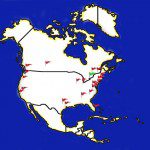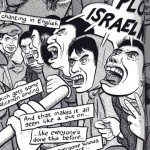Designate, Regulate, Emulate
Hard truths and misconceptions in Quebec’s attempt to accredit journalists
 A glass of wine sits on the floor of Massey College, casual yet precarious. I overhear a suit talking about someone doing “great work for the Huffington Post” as well-dressed intelligentsia move into the lounge for drinks and pleasantries.
A glass of wine sits on the floor of Massey College, casual yet precarious. I overhear a suit talking about someone doing “great work for the Huffington Post” as well-dressed intelligentsia move into the lounge for drinks and pleasantries.
“This is where we drink port and discuss Plato,” quips Rob Cribb, investigative journalist for the Toronto Star, as we slowly file in to the small library and wait. The shelves are filled with books on ethics and the history of journalism. We’re here for a debate.
In November 2009, Quebec Communications Minister Christine St-Pierre commissioned a report (PDF link) on the status of journalism. This led CBC journalist and Laval University professor Dominique Payette to suggest a status of “professional designation” for some Quebec journalists. This would entail preferential treatment by government sources and further protection of journalists under a code of ethics.
The reaction in English Canada, based on ensuing editorials, could only be described as a shit storm. The National Post’s Graeme Hamilton said that Payette “does not have faith in the laws of the market to provide adequate news to Quebecers.” Ezra Levant, in a Calgary Sun column, called St-Pierre “a natural censor,” made three references to the Soviet Union, and wondered “what kind of self-respecting, free society has a minister of communications?” (For the record, Canada did for almost 30 years. In 1996, when the position was abolished, our country re-emerged from a socialist dystopia and became free again.)
Three of the four debaters—Josh Meyer (national security journalist for the Los Angeles Times), Bert Bruser (a media lawyer at the Toronto Star), Esther Enkin (executive editor for the CBC), and Lise Millette (of the Presse Canadienne)—are in opposition to the move, one is in favour. (Guess, just guess.) Moderating is Julian Sher, author and award-winning freelance investigative journalist. The debate progresses as you’d expect, with most of the audience being in opposition.
And then an older woman, stone-faced through the rest of the proceedings, calls out to the three opposers without raising her hand: “It sounds like you’re just worried about this for yourselves!”
So, is she right?
——
At the controversy’s centre is the Fédération Professionnelle des Journalistes du Québec (FPJQ), a conglomeration of 2,000 Quebec journalists from Radio-Canada, Le Devoir, TVA, and other outlets. This debate has happened before—most recently in 2002—but this is the first time a full-fledged report has been produced and long-term action has been taken to negotiate with the Quebec government. (Two thousand and two’s proposal was killed on the floor.) When the designation issue was voted on for further action by the Quebec Press Council, the proposal gained seven yes votes and two nos, with three abstentions (including the CBC). The two opposing votes were The Gazette and an online publication called Rue Frontenac. But support during the fall and winter months has been withering during talks between the government and the press council.
“They couldn’t agree on who would have the greater say,” says David Johnston, The Gazette’s representative on the council. “The press council said—in its brief to the public hearings last week [the week of November 13]—it invited the government to set the rules on how that joint committee would work. In other words, government—whether directly or by arm’s length—would be deciding who a real journalist is and who isn’t.”
But in relation to government intervention, Dominique Payette herself wants to see the government very far from journalism: “What we wish to see is journalists talking to journalists and deciding who’s a journalist and who’s not.”
“The problem was that the day after we published the report, there [were] many mistakes [in] the way it was reported, especially in The Gazette,” Payette says. “They were talking about an ordre professionel—‘professional order’—which is very different from what we are promoting. So I knew that it would be difficult to go against a first mistake like that.”
In a way, this issue stands for two larger ones: a restructuring of Quebec politics on left-right lines as the threat of separation recedes, and a gap of misunderstanding between Québécois and anglophone journalists. Julian Sher, who works in Montreal, is in opposition to the FPJQ’s proposal, but holds a more understanding view of where it’s coming from.
“Quebec journalists didn’t suddenly drink stupid Kool-Aid in the morning and say, ‘We wanna be state-sanctioned stooges,’” says Sher. “And yet, if you look at some of the reaction in the rest of the country, that seems to be misinterpretation. [The FPJQ] are now saying that they’d walk away if the government was involved or was in control in any way. The main reason they want to do this is for protection of journalists dealing with big media monopolies.”
That the commission of the report has coincided with Britain’s News of the World phone-hacking scandal is strangely relevant, and may explain why the issue has pressed further ahead than in prior years.
And yet, the question of how the measure would deal with bloggers and “citizen journalists” is a key point for those in opposition. “They could’ve done that two, three years ago, when bloggers were less credible than they are today,” says David Johnston.
The official response from the Canadian Association of Journalists brought up that the public will return to bloggers if they, the public, have faith in the writer’s or blog’s practices, regardless of whether any of them receive a “professional” designation.
“There are so many people trying different kinds of journalism,” says Bert Bruser, media lawyer for the Toronto Star. “You have this concept of citizen journalists—people who are trying to get journalism into the world in different ways—and I think that that sort of thing needs to be encouraged, and it needs to flourish. And some sort of system where we’d license journalists in traditional media, well, I would counter that.”
But antagonism toward the FPJQ might be misdirected. It’s in fact the FPJQ itself that has raised concerns over the encroachment of government into the proposal’s sheer semantics. FPJQ president Brian Myles is assertive in his desire for government to be distanced from licencing itself: “I’ve stated many times that we don’t want to force this on everyone—we just want to provide certification for reporters and media outlets who want it. And you should have the chance to choose which model you want to follow.”
Complications have arisen, not unexpectedly, surrounding the disagreement between government, unions, and the press council over precisely what would define a journalist. Different perceptions mean difficulty in setting one specific code of ethics into place.
Millette elaborates: “The press council wants a law to force every enterprise to be a member of the press council. And if you are a journalist and you work for an enterprise who is not a member of the Press Council, you can’t be a professional. And we are opposed to that, too, because this is exactly the opposite of the spirit of the title.”
“Let’s say we give the state the right to create new organizations,” says Myles. “And we agree that, ‘well, your definition is sound. It’s gonna be put into effect in law.’ What happens in 10 years in our line of work, if the profession of reporter—if the business changes so much—that what was considered a reporter today is not the same thing in 10 years? For sure it’s gonna happen. Guess what happens for us? We have to knock on the National Assembly’s door to have those changes. So therefore, it’s not fully self-regulated any more, and this is why I’ve raised some red flags.”
Perhaps what’s most incensed anglophone journalists is the French-language test that comes in tandem with a status application. But Belgium and France already have professional status for journalists, with a test not unlike a bar exam for lawyers, or an exam that’s already taken in Quebec by translators, wherein those who apply to be a “professional translator” take an exam to become certified, even if they don’t have a diploma in translation.
What the debate reflects, though, is an anxious state of being in modern journalism. I’ll defer to Millette, relating an anecdote from the Massey College debate:
“There was someone from CBC, an old man, who said, ‘There was a time when I told my family member—or whoever—when I told them I was a journalist, I inspired something.’ And actually, I say exactly the same thing, and I don’t see the same light in their eyes.”
The next day, former News of the World reporter Paul McMullan told a public inquiry that “phone hacking is a perfectly acceptable tool, given the sacrifices we make, if all we are trying to do is get the truth.”














